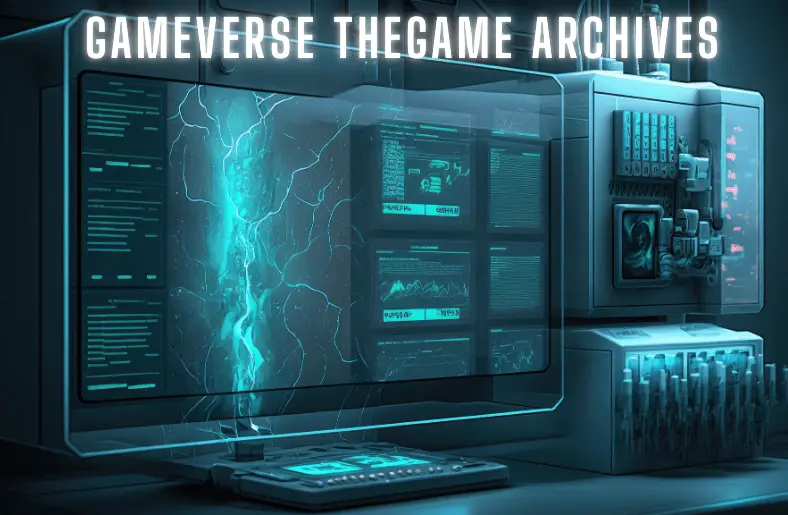Welcome to the evolving world of Gameverse Thegame Archives. As technology rapidly advances, preserving gaming history becomes increasingly crucial. This exploration highlights the significance of archiving video games, ensuring that classic titles and influential milestones are not lost to time. We’ll delve into how the gameverse captures the essence of gaming’s evolution—from early pixelated games to today’s immersive experiences. Understanding these archives helps us appreciate the journey of gaming, while also revealing how past innovations shape current trends. Join us as we uncover the impact of game preservation and its role in shaping the future of interactive entertainment.
The Evolution of Gaming in the Gameverse
The journey of gaming is fascinating and ever-changing. Initially, games were simple pixelated graphics. As technology advanced, graphics and gameplay became more sophisticated. Transitioning from 8-bit consoles to powerful PCs marked a significant shift. This evolution introduced expansive worlds and complex narratives. Meanwhile, mobile gaming emerged, allowing play on the go.
Today’s games are immersive, blending virtual reality and advanced AI. Consequently, the Gameverse showcases this progression vividly. By preserving these changes, we understand how each era influenced the next. Overall, this evolution highlights the dynamic nature of gaming and its impact on entertainment culture.
Technological Advancements and Their Impact
Technological advancements have revolutionized gaming in many ways. First, improved hardware has enhanced graphics. This shift led to more detailed and immersive experiences. Next, the introduction of high-speed internet transformed multiplayer gaming. Consequently, players now connect globally, enhancing social interactions. Additionally, virtual reality has created new gaming dimensions. Immersion levels made possible by this technology are previously unheard of.
Moreover, mobile advancements allowed games to be played anywhere. As a result, casual gaming has flourished. Each technological leap has influenced the game design and player expectations. Therefore, these advancements continually reshape the gaming landscape, pushing boundaries and setting new standards.
Trends in Game Preservation
Game preservation is becoming increasingly important. Initially, retro games were often lost to time. However, digital archiving has improved accessibility. As a result, old titles are now more easily preserved. Moreover, emulation technology allows classic games to be played on modern systems. Consequently, gaming communities actively work to restore and archive vintage games. Furthermore, preservation efforts include maintaining original hardware and software.
This approach ensures that Gameverse Thegame Archives remain playable for future generations. Additionally, recent trends focus on documenting game histories and development processes. Thus, game preservation continues to evolve, safeguarding gaming history for enthusiasts and researchers alike.
Innovations in Game Archives
Innovations are transforming game archives dramatically. Firstly, digital databases have streamlined access to classic games. Consequently, high-resolution scans of game manuals and covers enhance the archival experience. Furthermore, interactive exhibits now showcase gaming history with immersive technologies. Virtual reality tours allow users to explore digital archives in new ways.
Additionally, artificial intelligence aids in sorting and categorizing vast amounts of game data. Moreover, cloud storage solutions ensure the long-term preservation of game files. Community-driven projects also contribute by documenting rare and obscure titles. Thus, these advancements enrich game archives and preserve gaming heritage for future generations.
Popular Games and Their Legacy
Popular games often shape the gaming landscape significantly. For example, “Pac-Man” debuted memorable characters and gameplay. Consequently, it influenced countless sequels and spin-offs. Similarly, “The Legend of Zelda” set new standards for adventure games. Therefore, it continues to inspire game designers.
Additionally, “Super Mario Bros.” redefined platforming and character-driven storytelling. As a result, it remains a cornerstone of gaming culture. “Minecraft” revolutionized creativity with its open-world design. Thus, it empowers players to build and explore endlessly. These games have left lasting legacies, shaping genres and inspiring future developments. Indeed, their impact resonates through generations of gamers.
The Community and Culture of Gameverse Archives
The Gameverse Thegame Archives foster a vibrant community. Gamers from around the world connect through shared passions. Consequently, they exchange stories and strategies. Forums and social media enhance these interactions. Moreover, fan-created content enriches the experience. Creative artwork and mods showcase individual talents. This dynamic culture promotes inclusivity and collaboration.
Tournaments and events further unite players. In addition, discussions about gaming history deepen connections. Such engagement builds a strong sense of belonging. The community celebrates milestones and achievements together. Overall, this culture reflects the diverse and evolving nature of gaming. Indeed, it keeps the spirit of the Gameverse Archives alive.
Future Projections and Trends
Looking ahead, gaming technology will continue to evolve rapidly. Virtual reality, for instance, promises immersive experiences. Meanwhile, augmented reality could integrate games into daily life. Additionally, cloud gaming might make high-quality games more accessible. This shift could reduce the need for expensive hardware. Furthermore, artificial intelligence may enhance personalization in gaming. Players might enjoy tailor-made experiences based on their preferences.
Moreover, blockchain technology could revolutionize in-game economies and ownership. As these advancements unfold, the gaming landscape will expand. New genres and experiences will emerge, keeping the industry dynamic. Thus, the future of gaming looks both exciting and transformative.
Also Read: TheGameArchives Updates
Conclusion
In summary, the evolution of gaming reflects significant technological advancements and cultural shifts. From early pixels to immersive realities, gaming has transformed dramatically. Notably, technological progress has reshaped both gameplay and preservation. Consequently, modern innovations offer new ways to experience games. Similarly, the community and culture surrounding game archives highlight shared passions and connections. Looking forward, future trends promise further innovations and expansion. Thus, the gaming world remains dynamic and ever-evolving. Ultimately, as technology advances, gaming will continue to captivate and inspire. The journey from past to future underscores the game’s enduring impact and significance.




